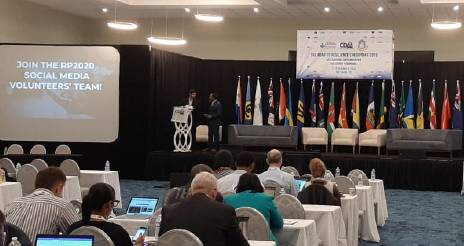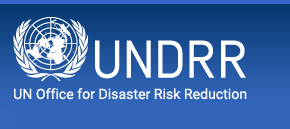- Our Mandate
- Mission and Objectives
- UNDRR in the UN
- Work Programme & Annual Reports
- Results Based System
- Work Partnerships
- Headquarters - Geneva
- SG-UN representatives for DRR
- Regional Office – The Americas and the Caribbean
- Head of the Regional Office – The Americas and the Caribbean
- What is Disaster Risk Reduction?
- What is the International Strategy?
- History of UNDRR
Caribbean takes temperature check head of key disaster risk forum
 Photo description: Nahuel Arenas, Deputy Chief of UNDRR – Americas and the Caribbean during the CDM Conference. Photo by: CDEMA
Photo description: Nahuel Arenas, Deputy Chief of UNDRR – Americas and the Caribbean during the CDM Conference. Photo by: CDEMA
By: Sophie Hares, UNDRR – Americas and the Caribbean
PANAMA CITY, Panama, 10 December, 2019 - Rolling out early warning systems, boosting community resilience and better protecting economies and livelihoods in the Caribbean topped the agenda at the Comprehensive Disaster Management conference in Sint Maarten as the region grapples with the growing impact of climate change.
Event organizer - the Caribbean Disasters and Emergency Agency (CDEMA) - said it was an opportunity to "temperature check" progress towards reducing disaster losses ahead of the 7th Regional Platform for Disaster Risk Reduction in Jamaica in July 2020.
"We are seeing this as a feed into that event. It will provide a lot of the messaging from the Caribbean, a lot of the key outputs we're hoping to take into the conversations next year," said Ronald Jackson, CDEMA executive director of CDEMA, in an interview.
The Regional Platform will also be a chance to measure progress in the Caribbean towards meeting a key Sendai Framework for Disaster Risk Reduction target that requires countries to have national and local disaster plans in place by 2020.
Six Caribbean countries and territories were finalizing plans which would show how risk has been integrated across sectors, and at least 80 percent of Caribbean countries would have their strategies in place by the time of the Regional Platform, said Jackson.
"At a time when economic losses from disasters are so high, showcasing the experience of the Caribbean and bringing the results of this meeting to the Regional Platform is particularly important," Nahuel Arenas Garcia, Deputy Chief of the United Nations Office for Disaster Risk Reduction (UNDRR), Regional Office for Disaster Risk Reduction.
"The Caribbean realises that disaster risk reduction only works when it's tied to development."
Developing innovative "risk layering" approaches would allow cash-strapped Caribbean countries to ensure their economies were buffered against disasters while helping finance resilience building measures, said speakers at the Sint Maarten event.
New micro-insurance products designed to protect the livelihoods of low-income groups and the fishing industry could also make it easier for governments to help ensure people can recover quicker after a disaster, said speakers.
To ensure even the most vulnerable and hardest to reach groups were alerted to hazardous events, it was essential to identify the gaps in early warning systems and explore technology such as mobile phone apps to better warn and inform people, they said.
Increased public awareness and education was crucial to make communities more resilient to hazards in the region which include floods, droughts, earthquakes and volcanic eruptions, alongside devastating hurricanes, the conference heard.
"This event provides an ideal platform where everybody can put their cards on the table and we can all see where each one is at, learn from each other," Andrew George, programme development officer at the National Disaster Office for St Lucia, said in an interview.
"The Caribbean, being one of the most disaster-prone regions in the world, we have to think comprehensive."
Forging closer links with the business sector and finding ways to bolster economic growth was also key, said speakers, given the heavy financial losses from disasters in the region where many countries are already indebted.
The Inter-American Development Bank estimated Hurricane Dorian cost the Bahamas around $3.4 billion, or a quarter of its gross domestic product, after it ripped through the country in October.
In 2017, the region suffered the costliest hurricane season on record with estimated losses of US$300 billion, due to the massive damages caused by Hurricanes Maria, Irma and Harvey.
Predicting increasingly intense and erratic weather conditions as climate change bites, speakers said more work was needed to strengthen building codes and ensure people better protect their homes and minimize losses.
"We ourselves have to be prepared at such a level that whenever a disaster strikes, we will not be reactive to it but will plan ahead in order to mitigate it as we want to be sure that we save lives," Renwick Quashie, a community representative from St. Vincent and the Grenadines, told the conference.
Working together to pool resources and strengthen the region as a whole was essential for countries which often confront similar challenges, said speakers.
"We as a region are all subject to these hazards and we're all in this as one together," Edmund Hinkson, Barbados Minister for Home Affairs, told the conference.
Related links
https://www.gov.bb/Ministries/home-affairs
Follow the UNDRR news online :
 Now we have twitter account @UNDRR Américas y el Caribe
Now we have twitter account @UNDRR Américas y el Caribe
JOIN US!
Tweets por el @UNDRR Américas y el Caribe
